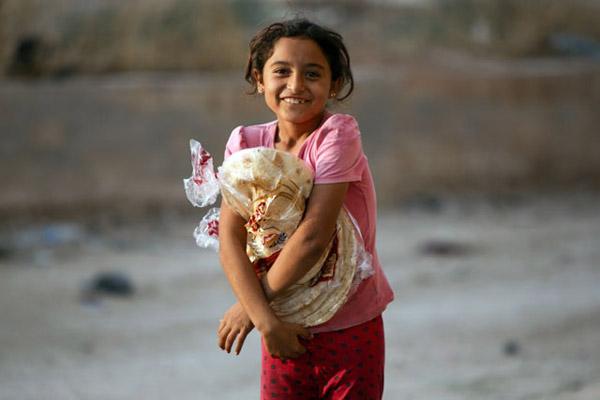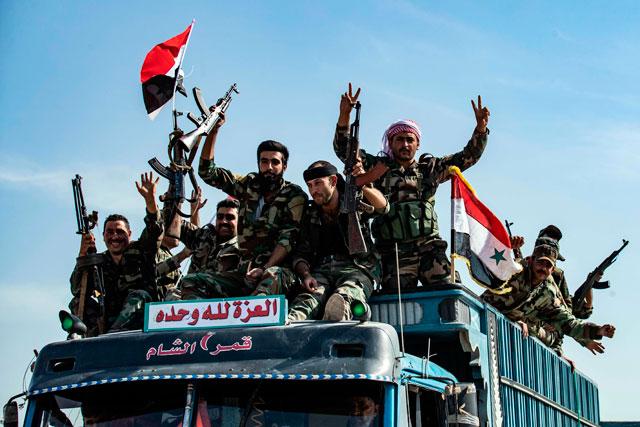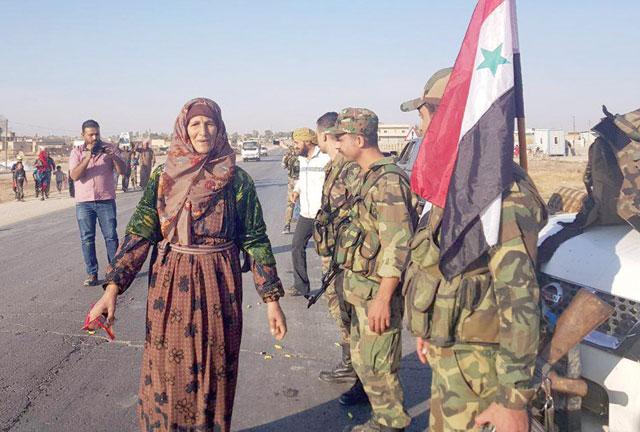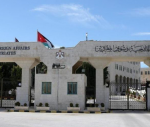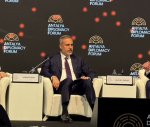You are here
Turkey defiant on Syria operation as US demands ceasefire
By AFP - Oct 16,2019 - Last updated at Oct 16,2019
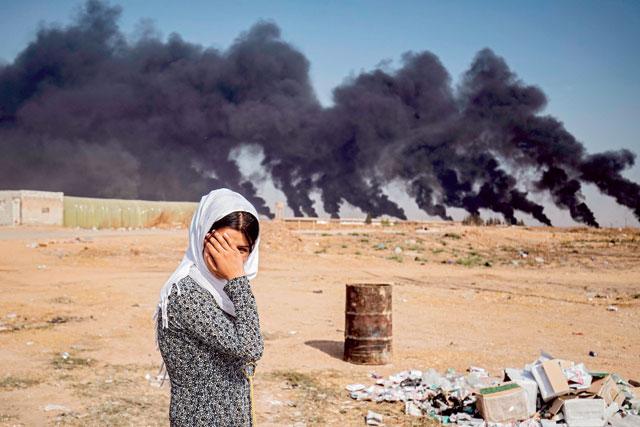
A woman covers her face as she stands along the side of a road on the outskirts of the town of Tall Tamr near the Syrian Kurdish town of Ras Al Ain along the border with Turkey in the northeastern Hasakeh province on Wednesday, with the smoke plumes of tyre fires billowing in the background to decrease visibility for Turkish warplanes that are part of operation 'Peace Spring' (AFP photo)
CEYLANPINAR, Turkey — Turkey rebuffed international pressure to curb its military offensive against Kurdish militants in Syria on Wednesday as US President Donald Trump dispatched his deputy Mike Pence to Ankara to demand a ceasefire.
President Recep Tayyip Erdogan vowed Turkey's operation — which has been facilitated by the withdrawal of US troops from northern Syria — would continue.
The only way to solve Syria's problems, Erdogan told parliament, was for the Kurdish forces to "lay down their arms... destroy all their traps and get out of the safe zone that we have designated".
But clashes continued across the region, with Kurdish fighters in the border town of Ras Al Ain burning tyres in a bid to blind Ankara’s warplanes and digging in against a ground offensive by Turkish-backed Syrian rebels.
“We are fully prepared to wage battles,” an official from the Kurdish-led Syrian Democratic Forces (SDF) told AFP. “The real battle has yet to start.”
Having struck a deal with Damascus over the weekend, Kurdish forces have joined with Syrian troops to take an abandoned US base between Kobani and Ain Issa, according to the Syrian Observatory for Human Rights.
The Turkish operation, now in its second week, has triggered a flurry of diplomacy among major powers.
Trump sent Pence along with his top diplomat Mike Pompeo to Turkey amid the greatest crisis in relations for decades between the NATO allies, with talks due in Ankara early Thursday.
Facing a barrage of criticism in Washington for abandoning the Kurds, Trump has slapped sanctions on three Turkish ministers and raised tariffs on its steel industry.
Pence’s office said the US would pursue “punishing economic sanctions” unless there was “an immediate ceasefire”.
But Trump again dismissed the idea that pulling out 1,000 troops — practically the entire US contingent in the region — had been a betrayal of Kurdish militants who bore the brunt of the fight against Daesh in recent years.
“The Kurds are very well protected,” Trump told reporters at the White House. “By the way, they are not angels.”
Russia steps in
Moscow has stepped into the void left by the US withdrawal, deploying patrols to prevent clashes between Syrian and Turkish forces.
Russian TV showed its forces alongside Syrian government troops taking up positions in and around the town of Manbij.
The Kremlin said it would host Erdogan for a meeting with his Russian counterpart Vladimir Putin in the coming days, to ensure the operation does not turn into all-out war between Turkey and Syria.
The Turkish government can count on widespread support for its operation at home, where decades of bloody insurgency by Kurdish militants have killed tens of thousands of people.
But Western powers fear it will endanger the battle against the Daesh terror group. Thousands of Daesh prisoners are held in Kurdish-run camps in the region.
Europe has taken an increasingly tough line with Turkey and several countries, including Britain, France and Germany, have imposed arms embargoes on Turkey over the operation.
Battle for border town
The Kurdish-led SDF has mounted a desperate defence to the east of Ras Al Ain, using tunnels, berms and trenches.
A Syrian fighter serving alongside Ankara’s forces said his forces were trying to cut Kurdish supply lines from nearby Hassakeh to facilitate their advance on the town.
Since launching their assault on October 9, Turkey and its Syrian rebel proxies have secured more than 100 kilometres of border, but Ras Al Ain has held out.
Erdogan, who like Trump faces political difficulties at home, wants to create a buffer zone stretching 30 kilometres from the border into Syrian territory.
He wants to destroy Kurdish hopes of an autonomous enclave that could serve as a launching pad for attacks in Turkey, and to resettle some of the 3.6 million Syrian refugees Ankara is hosting.
Erdogan said that once the safe zone was established, “stretching from Manbij to the Iraqi border”, then the operation would have “ended on its own”.
The offensive has left dozens of civilians dead, mostly on the Kurdish side, and displaced at least 160,000 people.
Related Articles
RAS AL AIN, Syria — Turkish and Kurdish leaders accused each other of violating a US-brokered truce in northeastern Syria even as it appeare
RAS AL AIN, Syria — Kurdish fighters battled to defend a key Syrian border town from Turkish-backed forces on Tuesday as Russia seized on a
TALL TAMR, Syria — The Syrian army sent troops towards the Turkish border Monday to contain Ankara's deadly offensive against the Kurds, ste


